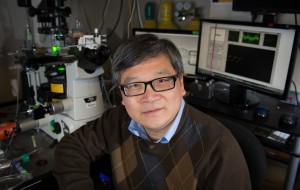T cell mechanoimmunology at the molecular level
The key feature of T cell recognition is self vs. non-self discrimination, permitting T cells to ignore normal cells yet destroy those that have been altered either by pathogens or by malignant transformations. Recognition is initiated by binding of the T cell receptor (TCR) to a peptide presented by a major histocompatibility complex molecule (pMHC). This cognate process requires physical contacts between the T cell and an antigen presenting cell where the interacting molecules reside, therefore providing ample opportunity for force to affect binding. We will present data that support the hypothesis that the TCR functions as a mechanosensor; as such, it leverages force exerted on its bond with pMHC for proper recognition. Further, deficient T cell anti-tumor immunity may result, at least partly, from impaired antigen recognition within the tumor microenvironment, as manifested by the altered properties of TCR–pMHC bonds. Our study deciphers the inner workings of TCR mechanosensory machinery, provides molecular insights underlying TCR signal initiation, and helps explain how T cells perform their biological functions.
Bio
 Dr. Zhu is Regents’ Professor of Biomedical Engineering and holds the J. Erskine Love Endowed Chair in Engineering at the Georgia Institute of Technology and Emory University. Dr. Zhu received his B.S. from Zhejiang University, China, in 1982 and M.S. and Ph.D. from Columbia University in 1985 and 1988, respectively. Dr. Zhu’s research interest is molecular biophysics of the immune and vascular systems, with focuses in the mechanobiology of T cells and platelets. He pioneered the analysis of interactions at the junctional interface between molecules anchored to two apposing surfaces, i.e., the so-called two-dimensional interaction. His lab conceptualized and/or demonstrated several types of mechanical regulation of protein unbinding and unfolding (catch bonds, force-history, cyclic mechanical reinforcement, and dynamic catch) in a variety of receptor–ligand systems. Dr. Zhu received the Harold Lamport Award from the Biomedical Engineering Society in 1991, Yuan-Cheng Fung Award from American Mechanical Engineer Society in 1992, Presidential Faculty Fellows Award from National Science Foundation in 1993, and Award in Hemarheology and Microcirculation from International Clinical Society of Hemarheology in 2005. He is a fellow of The American Institute for Medical and Biological Engineering (AIMBE) and a fellow of The Biomedical Engineering Society.
Dr. Zhu is Regents’ Professor of Biomedical Engineering and holds the J. Erskine Love Endowed Chair in Engineering at the Georgia Institute of Technology and Emory University. Dr. Zhu received his B.S. from Zhejiang University, China, in 1982 and M.S. and Ph.D. from Columbia University in 1985 and 1988, respectively. Dr. Zhu’s research interest is molecular biophysics of the immune and vascular systems, with focuses in the mechanobiology of T cells and platelets. He pioneered the analysis of interactions at the junctional interface between molecules anchored to two apposing surfaces, i.e., the so-called two-dimensional interaction. His lab conceptualized and/or demonstrated several types of mechanical regulation of protein unbinding and unfolding (catch bonds, force-history, cyclic mechanical reinforcement, and dynamic catch) in a variety of receptor–ligand systems. Dr. Zhu received the Harold Lamport Award from the Biomedical Engineering Society in 1991, Yuan-Cheng Fung Award from American Mechanical Engineer Society in 1992, Presidential Faculty Fellows Award from National Science Foundation in 1993, and Award in Hemarheology and Microcirculation from International Clinical Society of Hemarheology in 2005. He is a fellow of The American Institute for Medical and Biological Engineering (AIMBE) and a fellow of The Biomedical Engineering Society.
